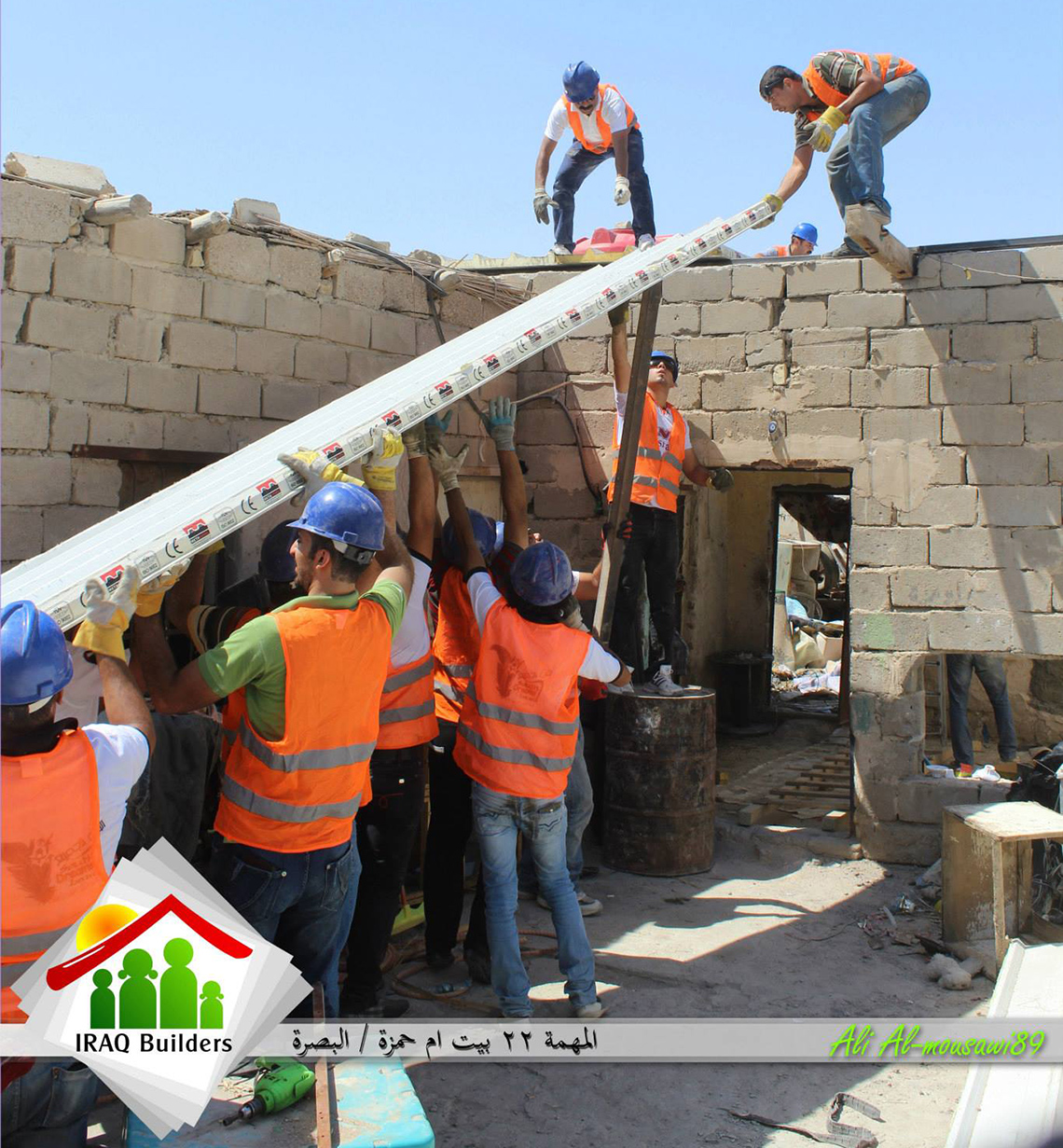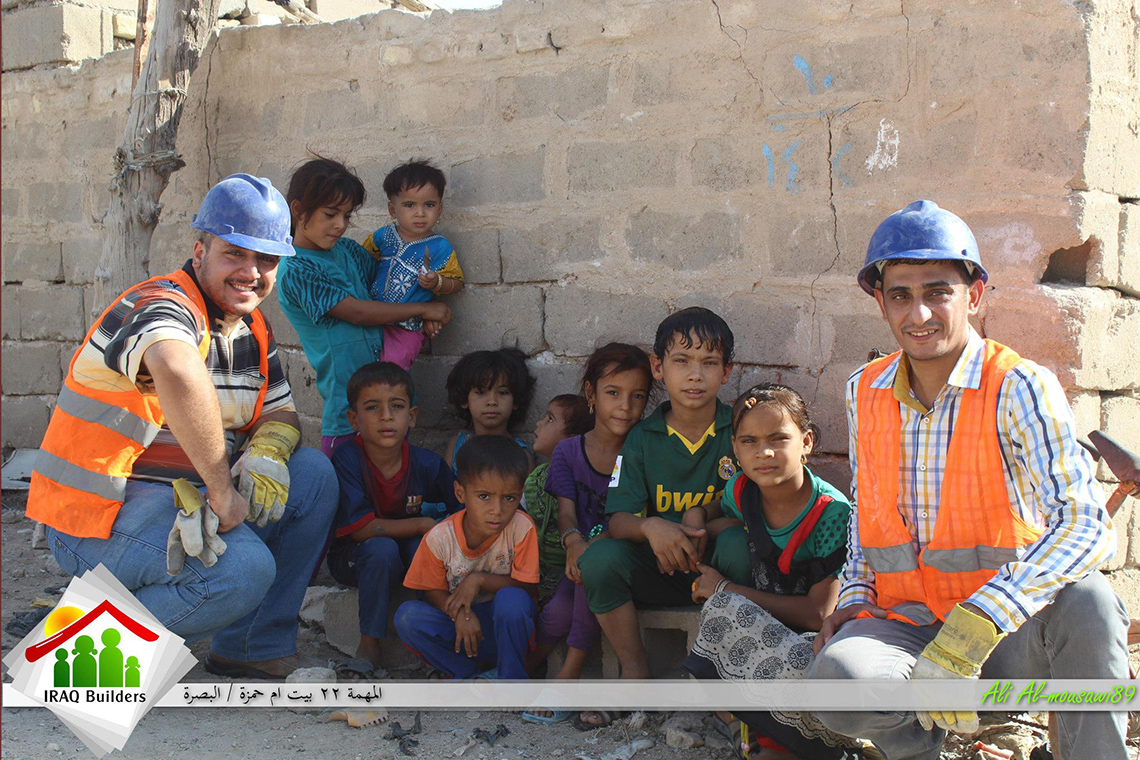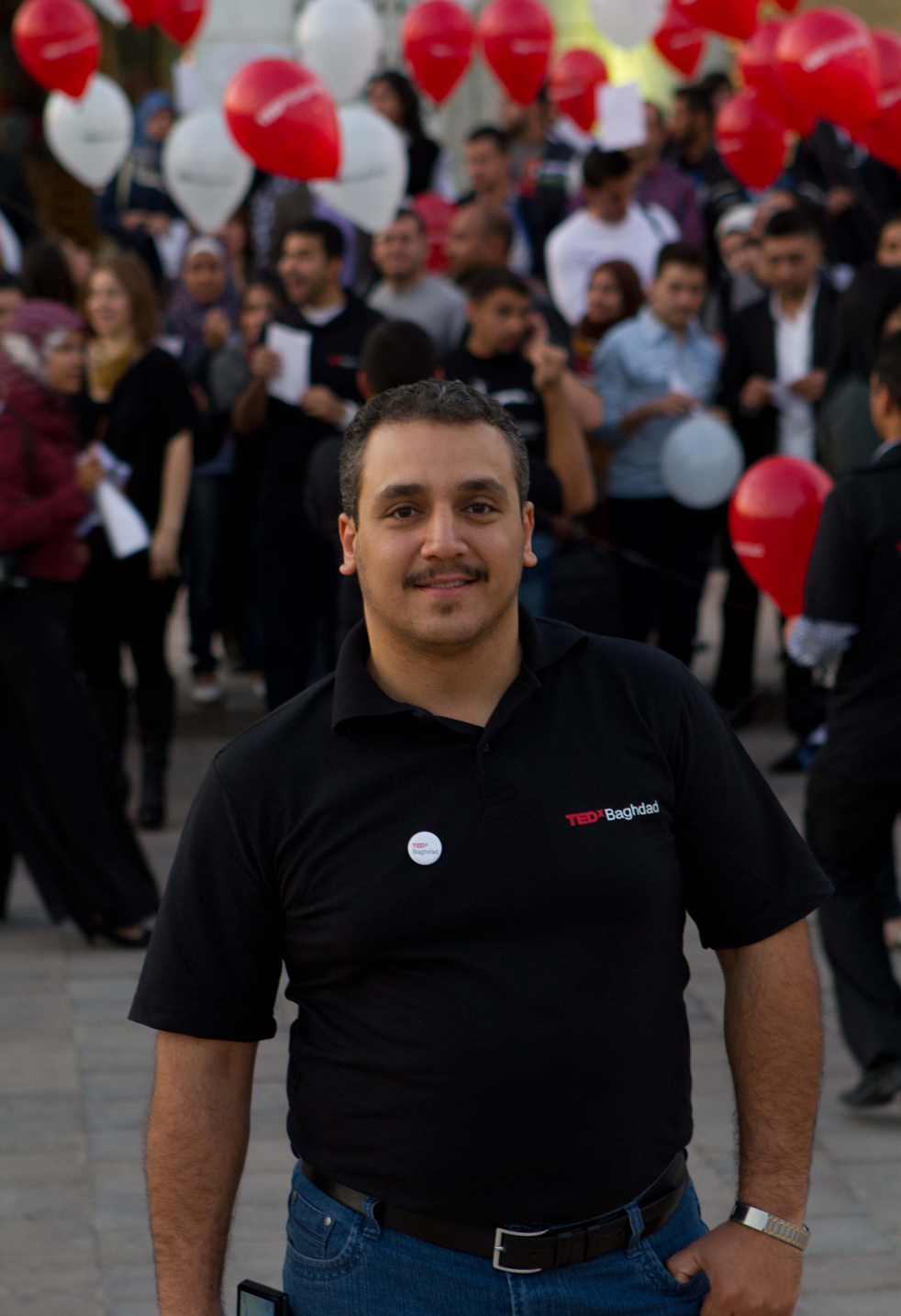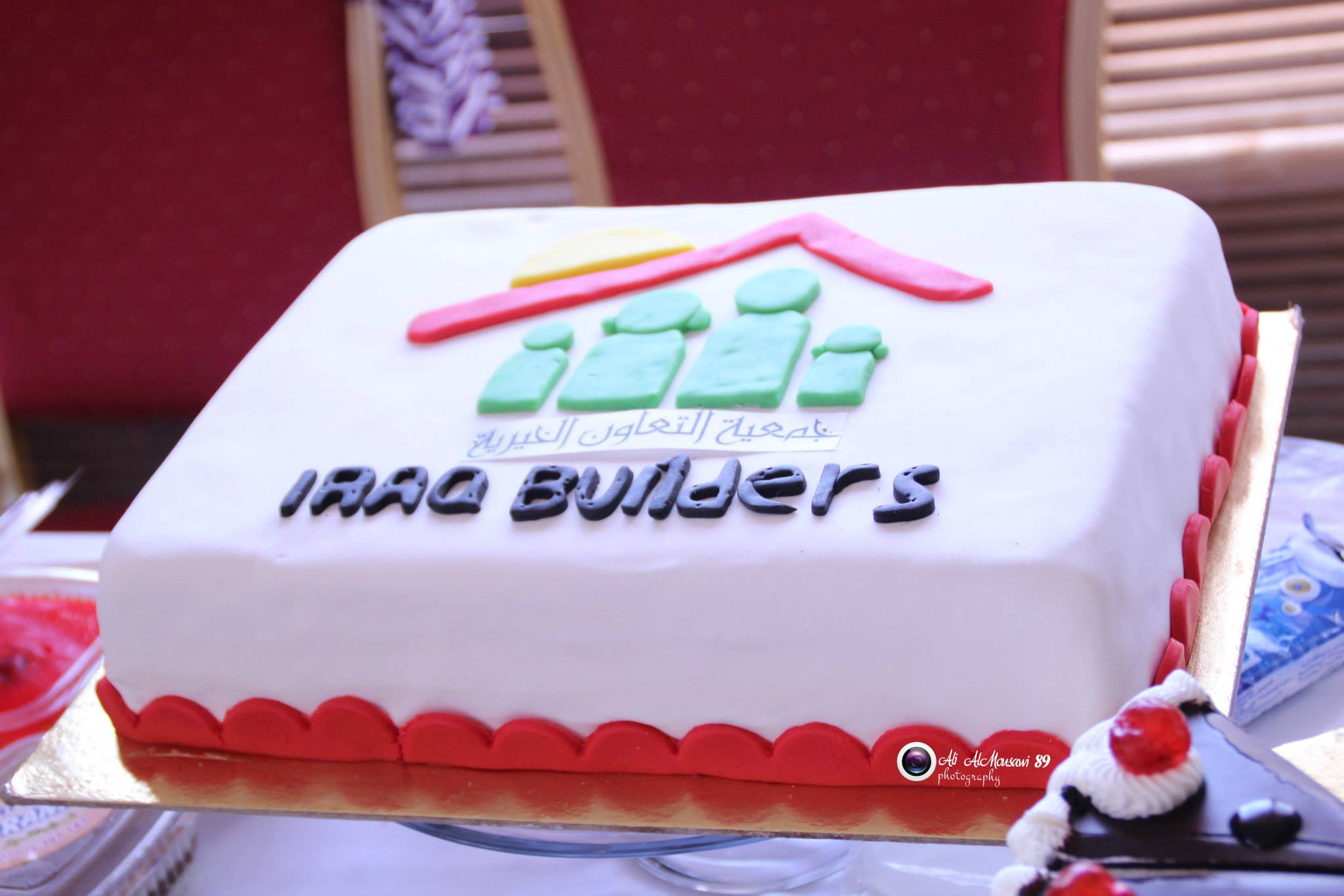
A team from Iraq Builders puts a new roof on a bombed-out home in Basrah last August. Photo: Courtesy Iraq Builders
If you happened upon a small park in Nasiriyah, Iraq, last June 28, you would have noticed a group of 15 people, fast asleep, with blue hard hats and orange vests nearby. This group was not homeless, nor staging some kind of occupation. They were volunteers from Iraq Builders who had traveled more than 350 kilometers to repair the badly damaged home of a family without the means to do repairs themselves. Since they didn’t have a place to stay for the night, they slept in the park.
“It was nothing,” says Elaf Mohammed Al-hijazi, who’s a doctor as well as the social media coordinator for TEDxBaghdad and the co-founder of Iraq Builders.
Iraq Builders started a year ago, out of a conversation Elaf Mohammed had with friend Zaid Zahed Hussein. The two wondered: could they use Facebook to coordinate volunteer projects around Baghdad? They posted a status update asking people to join them the next day to serve meals at a local school. 123 people offered to volunteer. From there, the group started posting open calls for actions around the city, usually aimed at helping widows, orphans and families in need. The group has grown steadily. Recently, they held a one-year anniversary party and invited more than 500 guests, many of whom had joined actions throughout the year.
Over the past year, that night in the park in Nasiriyah sticks out in Elaf Mohammed’s mind as especially meaningful—and not just because Iraq Builders helped a family of 14 living on $5 a day. When a group of six locals saw the team asleep in the park in the morning, they woke them up to ask what they were doing. The men were so moved by the answer that they dropped what they were doing and pitched in with the build.
Another memorable action took an Iraq Builders team to Basrah, more than 500 kilometers away from Baghdad, to aid a widow. Elaf Mohammed is still amazed that — despite the fact that it required a long and dangerous drive — 19 people offered to hop on a rented bus and spend a weekend helping someone they didn’t know. The recipient of their kindness was a woman who’d lost her husband in 2003 and was living with her eight children in a defunct military base. Like many of the people Iraq Builders has helped, they needed a new roof.
“I don’t know how I can describe it,” says Elaf Mohammed, shaking his head. “It was bombed during the war. It was a room with many holes in it because of the shells, and she had closed the holes with pieces of thick paper, curtains and pieces of plastic. The roof was slices of metal.”
The team from Iraq Builders boarded up the holes in the room with brick and cement, and removed what remained of the roof to create a new one out of sandwich panels. The group also bought an air conditioner and small refrigerator for the family.
Meanwhile, female volunteers sat down with the woman and children to talk to them.
“She said, ‘I didn’t believe that you would come. Even my brother who lives next door, he didn’t help me like you did. You are strangers living in a faraway place, but in spite of that, you answered my call and you helped me,’” recalls Elaf Mohammed. “Her kids had an amazing response too. They said, ‘Your visit to us, it was enough [to show] that there is some hope in this world.’ They told us since their father had died in the battle with the British and American troops, that no one — not their government, not their local authorities — asked about them … We try to create bonds between ourselves and families and tell them they are not alone. We want to be your friends, your supporters, your extended family.”

Elaf Mohammed (left) poses with the children whose home the team helped rebuild in Basrah. Photo: Courtesy Iraq Builders
In addition to repairs, Iraq Builder also raises money for families in need. They do this by posting call-outs on Facebook and asking volunteers to collect small sums from friends, family members and coworkers.
Sometimes, volunteers will even head out into the city to collect money in person. “We gather in small groups and go out to the local malls and social clubs, and we ask people if they want to donate,” says Elaf Mohammed. “The amazing thing about this is, 90 percent of our team are college graduates — some of them doctors, dentists, pharmacists, pilots, army engineers, college students — so going to the street and asking people to give money is something they’ve never experienced before. It’s a very intimate experience.”
Elaf Mohammed, with a thick mustache and a bodybuilder’s physique, tells the story of another woman he remembers helping via fundraising.
“Her husband was killed during the sectarian violence between 2006 and 2007. She told us she had a 10-year-old child who needed a kidney transplant. At first, we said, ‘We are Iraq Builders. We build roofs. What can we do for you?’” he recalls. “I discussed it with my colleagues and we started a campaign via Facebook. We raised about 36 million Iraqi dinar, which is about $30,000. The child had the transplant surgery. She’s doing well now.”
Elaf Mohammed is very familiar with hospitals—he is in his third year of residency, studying internal medicine. And while his passion now is saving lives, he wasn’t so sure at first.
“In Iraq, most children want to be doctors, engineers or pilots in the army — we are raised to feel heroic energy about those things. If you have high grades, you must be a doctor,” he says. “The first few months in college, I said, ‘Okay, why am I touching corpses and doing dissections?’ But later on, I fell in love with medicine — when I started dealing with patients and I saw the effect of my work on their health, on their families.”
It was one of Elaf Mohammed’s friends from the hospital who first brought him to TEDxBaghdad in 2011 — and he instantly felt at home at the event. Organizer Yahay AlAbdeli quickly homed in Elaf Mohammed’s lively social media following, where he shared health education materials. He asked Elaf Mohammed to become social media coordinator for the event.

Elaf Mohammed at TEDxBaghdad. Photo: Courtesy of TEDxBaghdad
Nate Mook, who curates many TEDx events, recalls a funny-now-but-tense-then moment working with Elaf Mohammed at TEDxBaghdad. “We worked together closely, as I was running the livestream and internet, while he was overseeing social media. One time, we climbed on the roof of the Al Rasheed hotel to set up internet antennas, and almost got arrested by worried security personnel who thought we could be snipers,” he says. “But the effort was a success and TEDxBaghdad was streamed live to tens of thousands around the world, in both Arabic and English.”
While Elaf Mohammed keeps his Iraq Builders and TEDx lives very separate, he says that many of the skills he uses to coordinate Iraq Builders are things he learned working on TEDxBaghdad—for example, dividing volunteers into teams and creating strong branding.
And of course, doing both Iraq Builders and TEDxBaghdad, while also balancing his career and family (he has a wife and two children), is not easy. While his family is very supportive of Iraq Builders, he says his friends sometimes question it.
“My friends, some of them ask me, ‘Why are you doing this? You are a doctor—you can work in a private clinic and it’s a clean, easy job. Why you are spending your spare time helping people you don’t know?’ I tell them: I don’t know why I am doing this. But in my inner self, I feel it is a kind of a duty. I must do this.”
He also regularly hears concerns from potential volunteers and donors. “People sometimes accuse us of being supported by the government or by an outsider organization. They always ask us, ‘What is your real agenda?’” he says. “At first, I was confused. But now, I have a simple answer for them: Come and watch what we are doing. If you have money or clothes or blankets you want to donate, and you don’t trust us, come with us, and we will let you hand these donations to the people directly.”
Distrust has run high in Baghdad recently. In the week before the April 30 parliamentary election (Iraq’s first since US troops left in 2011) — for which votes are still being tallied — terrorist blasts ripped through the city. Still, Iraqis lined up in droves, displaying purple fingers to show they had voted.
“On our way to the polling center, we were afraid—but our determination to have a better future made us overcome our fears and vote,” says Elaf Mohammed. “Since there were serious threats, my family decided to vote in two groups—me and my mom, then my wife and my dad, with the children staying at home. I didn’t go with my wife, since we didn’t want to leave the kids with my parents.”
It was in this tense but exciting moment that Iraq Builders tried out a new initiative: holding a charity market selling baked goods, jewelry, hand-painted mugs and more. “It was something totally new for most of [the volunteers],” says Elaf Mohammed. “We made about $10,000 in seven days!”
And this is the message Elaf Mohammed and his fellow Iraq Builders would like to share with the world.
“In spite of all the negative images of Baghdad — executions, terrorist attacks — in the middle of this chaos, there is a bright side,” he says. “Life in Baghdad is very difficult and, in spite of this, people believe that another good day will emerge. If you know the history of Iraq—and Baghdad especially—it goes through a dark phase and then rises again …[Iraq Builders] has helped 45 families in Iraq, but there are still 36 million Iraqi people. Some might say: What’s the point? The point is that we are doing what should be done during this period. We are refusing to be the broken circle in this chain of civilization from Babylon till now. We refuse to be the dark ages of Iraq.”

A cake to celebrate a year of Iraq Builders. Photo: Courtesy of Iraq Builders
TEDx events have taken place in more than 2,000 cities in 150+ countries. Every month, the TED Blog brings you a profile of a fascinating member of this global community. Know a TEDx organizer we should profile, for their work behind-the-scenes on the event or for what they do for their community? Email kate (at) ted (dot) com and tell us about them.
Watch talks from TEDxBaghdad 2013 »
Find out more about this event in Iraq »
Comments (9)